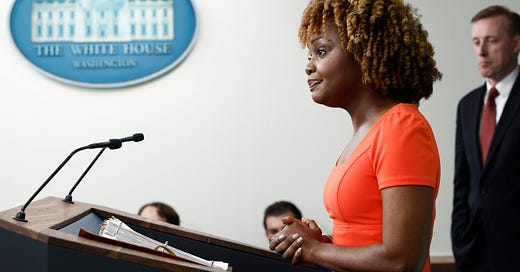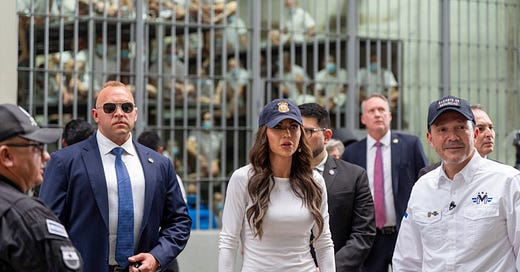
One of the most interesting Republican House primaries of the cycle is happening tonight in Virginia’s 5th District: Rep. Bob Good, chair of the hard-right House Freedom Caucus, is fighting hard to fend off a challenge from state Sen. John McGuire, a former Navy SEAL.
Good’s conservative credentials are sterling, and the district is plenty red. But he’s made two powerful personal enemies in the last year: Kevin McCarthy, whom he helped oust as House speaker last year, and Donald Trump, whom he irked by backing Ron DeSantis for president.
For a decade now, guys like Good have made fighting the Republican establishment their bread and butter. Now, however, that establishment is embodied by Trump, a guy even their most antiestablishment-ish voters love. In an unprecedented move, one member of the Freedom Caucus—Rep. Warren Davidson of Ohio—broke ranks yesterday to follow Trump’s lead and endorse McGuire.
Will Good survive? We’ll let you know tomorrow! Happy Tuesday.
Not Fair, But Not ‘Fakes’
Republicans online have been having a lot of fun for months bouncing around video clips of purported senior moments from Joe Biden, and the White House has had about enough of it. At yesterday’s press briefing, press secretary Karine Jean-Pierre denounced “cheapfake videos” of Biden “made in bad faith,” saying that “right-wing critics of the president have a credibility problem.”
“It tells you everything you need to know about how desperate Republicans are here,” White House press secretary Karine Jean-Pierre told reporters Monday. “Instead of talking about the president’s performance in office—and what I mean by that is his legislative wins, what he’s been able to do for the American people across the country—we’re seeing these deepfakes, these manipulated videos.”
This is a messaging headache that has dogged Biden for ages now: If a voter’s social-media algorithms serves him up any right-wing content at all, pretty much all he ever sees of Biden is video snippets in which the president appears slow, infirm, or incoherent. It’s a real problem for the White House, and it’s no surprise they’re finally pushing back.
And yet, call me crazy: In my view, talking about “deepfakes” and “manipulated videos” is about the most foolish, counterproductive way of pushing back on the deluge of “Biden looks old” content I can imagine.
If you’re not up to speed on the lingo, deepfakes and cheapfakes are terms used to describe online videos that are deceptively edited in different ways. A deepfake is specifically a video manipulated using AI techniques. You may recall a famous one Buzzfeed released in 2018 to show the dangers of the technology, in which an apparent video of Barack Obama speaking into camera was revealed to actually be an impersonation by comedian and director Jordan Peele, lip-synched to an AI-generated Obama.
Cheapfakes are the low-tech version: Content that’s been deceptively edited in more traditional ways.
But here’s the thing: When it comes to the bulk of the “Biden’s real old” content the RNC and other right-wing content creators pump out, neither term applies.
It’s not like these content creators are being scrupulous; some of the Old Guy Biden clips that whiz around the internet are truly misleading. One clip this week purported to show Biden wandering aimlessly away from a G7 photoshoot with other world leaders; in fact, he was walking over to greet some skydivers who had just landed out of frame. (Sidebar: The G7 sounds like a hoot!)
For the most part, however, the issue in these cases isn’t the video clips themselves, which are unedited—Biden standing on stage at a donor event to bask in applause until Barack Obama gives him a gentle tug on the arm; Biden standing motionless at a musical performance celebrating Juneteenth while people around him dance.
The issue is in the content-delivery mechanisms that strip those clips of context and fling them around the internet alongside incendiary and out-of-proportion claims about what they depict and suggest.
In a great post over at his Popular Information newsletter yesterday, reporter Judd Legum broke down how these claims get laundered into official-seeming local news reports that reach a whole different set of online readers:
This month, Sinclair Broadcast Group has flooded a vast network of local news websites with misleading articles suggesting that President Biden is mentally unfit for office. The articles are based on specious social media posts by the Republican National Committee (RNC), which are then repackaged to resemble news reports. The thinly disguised political attacks are then syndicated to dozens of local news websites owned by Sinclair, where they are given the imprimatur of mainstream media brands, including NBC, ABC, and CBS.
For example, on June 10, Biden attended an event on the White House lawn celebrating Juneteenth. The event included a musical performance, and Biden listened with a broad smile but did not dance. The RNC’s “research” team posted a clip of Biden on X with the caption, “Why isn’t Biden moving?” Hours later, the RNC’s post was embedded into an article published by Sinclair’s National Desk, with the headline, “Biden appears to freeze, slur words during White House Juneteenth event.”
The article claims, without evidence, that Biden was “dazed” and only “snapped out of his stupor” when the man next to him put his arm around his shoulder. It also quotes the Trump campaign’s social media response to the same RNC video: “Lights are on but no one’s home.” The incident was described as one of “multiple senior moments” for Biden during the event.
You get the idea: There’s a whole online ecosystem dedicated to ballooning Biden’s gaffes and miscues into an overwhelming narrative of presidential senility. There’s only one non-rotten link in the entire information chain: The video clips themselves, which—again—are legitimate, if often lacking context. And yet it’s the integrity of the clips themselves on which the White House is choosing to take their stand, by trying to turn the conversation into one about “deepfakes,” “cheapfakes,” and “manipulated videos.”
I shouldn’t have to tell you that this is perhaps the best thing Team Biden could do to play into the hands of the “Methuselah Biden” cottage industry. And indeed, many of these same accounts enthusiastically helped Jean-Pierre’s comments rack up millions of views on social media yesterday.
Why Team Biden is doing this is obvious: Even when correctly contextualized, Biden does still present as very old in these clips. But I’ll keep saying it until I’m blue in the face: Trying to convince voters that Biden only looks old because of Republican subterfuge is an argument they don’t have a prayer of winning. He’s the oldest president ever! It shows! The sooner the White House gets comfortable with that fact, the sooner they can pivot to the question that actually matters: So what?
Jean-Pierre and others in the president’s orbit should call out Republican bad faith in their attacks on Biden’s age and acuity. They should point out the dangerous online apparatus that’s spun up to magnify and further distort these attacks. And they’re absolutely right to point out that Republicans would rather focus on optics than Biden’s legislative record for a reason. But the White House needs to get over its weak-looking and counterproductive knee-jerk reaction to concerns about Biden’s age—and save the talk of deepfakes for when there’s deepfakes to talk about.
—Andrew Egger
Bonn, Beethoven, and Me
I’m writing this from Bonn, where I was on a panel yesterday at a conference hosted by Deutsche Welle on challenges to the media and democracy.
I began my remarks by saying that it was good to be back in Bonn, for I think the first time since being here with Vice President Quayle when he met in June 1991 with German Chancellor Helmut Kohl and other members of the government. In fact, the main sessions of this year’s conference are taking place in the former West German Bundestag, where we had meetings 33 years ago.
I also noted that yesterday was June 17, the anniversary of the 1953 uprising against the Soviet-backed Communist government of East Germany.
And so I said a word or two about how much the experiences of the Cold War meant to my generation, and about how moving I’d found that 1991 visit so soon after the fall of the Berlin Wall to a free and democratic reunified Germany.
I think my somewhat idiosyncratic Cold-War themed opening remarks went over fine. Though I’ll admit that, looking at the faces in the audience of participants in their 30s and 40s, it did occur to me that 1991 was a long time ago. After my panel, a German government official told me that she appreciated my bringing a little historical perspective to the conference. She also commented wryly that she was barely in high school at the time of my last visit.
The conference as a whole was very much focused on the challenges of the moment. Which is fine! Those challenges—new modes of disinformation, increasing challenges to a free media, recent failures of governance in the democracies—are real. And I was pleased that the holiday-from-history mood that might have prevailed a decade or two ago seemed to have receded.
The conferees seemed (mostly) to grasp that history has returned. Indeed, two of my fellow panelists, journalists from Brazil and Bangladesh, spoke powerfully about the challenges of maintaining press freedoms in the face of new attacks from authoritarian governments. And there seemed to me somewhat less of an “it couldn’t happen here” European and American complacency than there once would have been.
On the other hand, the conference did feel pretty remote from the largest war in Europe since 1945, raging only a thousand miles away. In the public discussion, so far as I could tell, Ukraine barely came up. I did mention Ukraine, and afterward the Mayor of Bonn told me that Bonn is kind of a sister city to Kherson, and that she was proud to have accompanied the Mayor of Kherson to the Ukraine Recovery Conference in Berlin last week. And a Ukrainian businessman came up to tell me about an effort he was engaged in to get real news and truth-telling into Russia to help free the Russian people from Putin’s propaganda machine.
So people do understand that freedom matters. Truth-telling matters. On the whole, it’s been an encouraging visit.
In the spirit of truth-telling, I will confess that I’m about to skip some of the second day of conference today in order to see Beethoven’s house, now an interesting (I’m told) small museum dedicated to his life and work.
But I believe this is in accord with the spirit of the gathering.
After all, the museum now has an exhibit on the 200th anniversary of his Ninth Symphony. And in his historic Christmas Day 1989 performance of Beethoven’s Ninth in the newly unified Berlin, Leonard Bernstein famously substituted the word ‘Freiheit’ (‘freedom’) for ‘Freude’ (‘joy’) in the Schiller poem that provides the lyrics for the symphony’s choral finale.
So Beethoven’s Ninth became, on Christmas Day 1991, an Ode to Freedom. How could I pay tribute to freedom when here in Bonn without a visit to Beethoven’s house? It’s my personal small ode to freedom.
That’s my line, and I’m sticking to it.
—William Kristol
Quick Hits: Who’s Complicit?
Of all the things you’re not really supposed to do in media Polite Society, talking down about voters is up near the top. Over at The Atlantic, Peter Wehner’s grasps that third rail with both hands—albeit in an admirably thoughtful and empathetic way—with a new piece on “The Motivated Ignorance of Trump Supporters”:
Motivated ignorance refers to willfully blinding oneself to facts. It’s choosing not to know. In many cases, for many people, knowing the truth is simply too costly, too psychologically painful, too threatening to their core identity. Nescience is therefore incentivized; people actively decide to remain in a state of ignorance. If they are presented with strong arguments against a position they hold, or compelling evidence that disproves the narrative they embrace, they will reject them. Doing so fends off the psychological distress of the realization that they’ve been lying to themselves and to others.
Motivated ignorance is a widespread phenomenon; most people, to one degree or another, employ it. What matters is the degree to which one embraces it, and the consequences of doing so. In the case of MAGA world, the lies that Trump supporters believe, or say they believe, are obviously untrue and obviously destructive. Since 2016 there’s been a ratchet effect, each conspiracy theory getting more preposterous and more malicious. Things that Trump supporters wouldn’t believe or accept in the past have since become loyalty tests. Election denialism is one example. The claim that Trump is the target of “lawfare,” victim to the weaponization of the justice system, is another.
I have struggled to understand how to view individuals who have not just voted for Trump but who celebrate him, who don’t merely tolerate him but who constantly defend his lawlessness and undisguised cruelty. How should I think about people who, in other domains of their lives, are admirable human beings and yet provide oxygen to his malicious movement? How complicit are people who live in an epistemic hall of mirrors and have sincerely—or half-sincerely—convinced themselves they are on the side of the angels?



















The problem is the clips aren’t accurate. If you take a video and crop it or cut it short (like the video of Biden supposedly looking for a chair that wasn’t there), the video is no longer accurate. And saying that this is just an online phenomenon when hundreds of local TV stations are getting a script to repeat on air shows how pervasive this content can become. All of a sudden, millions of Americans that rate their local new sources as reliable are getting fed a bunch of nonsense. That HAS to be fought. Not fighting it would be campaign malpractice!
"Motivated ignorance". I used to call it "willful ignorance to avoid cognitive dissonance."
As my Mom said to me in 2005 "I don't like talking about these things with you. You have all these facts, and I just know what I believe." And just this past weekend, The Man was trying to get through to his dad, saying that Fox had been found liable for fraud to the tune of a billion dollars for lying about the election. His dad's response: "I don't care."
All we can do is defeat and minimize these people. There is no convincing. It's a bigger self-delusion that the Lost Cause, and that's saying something.